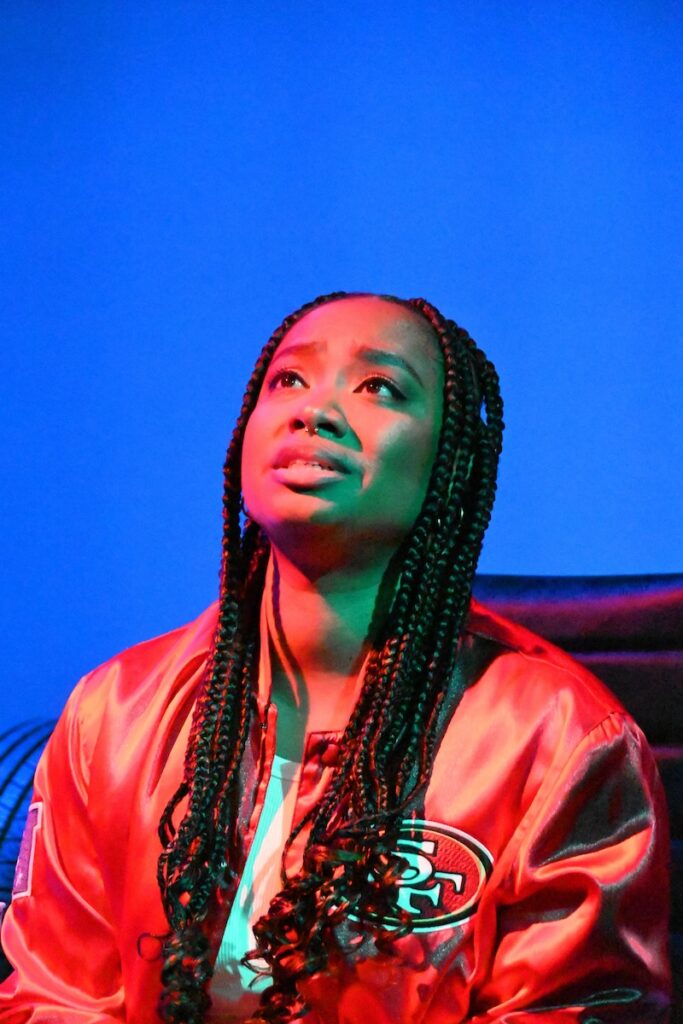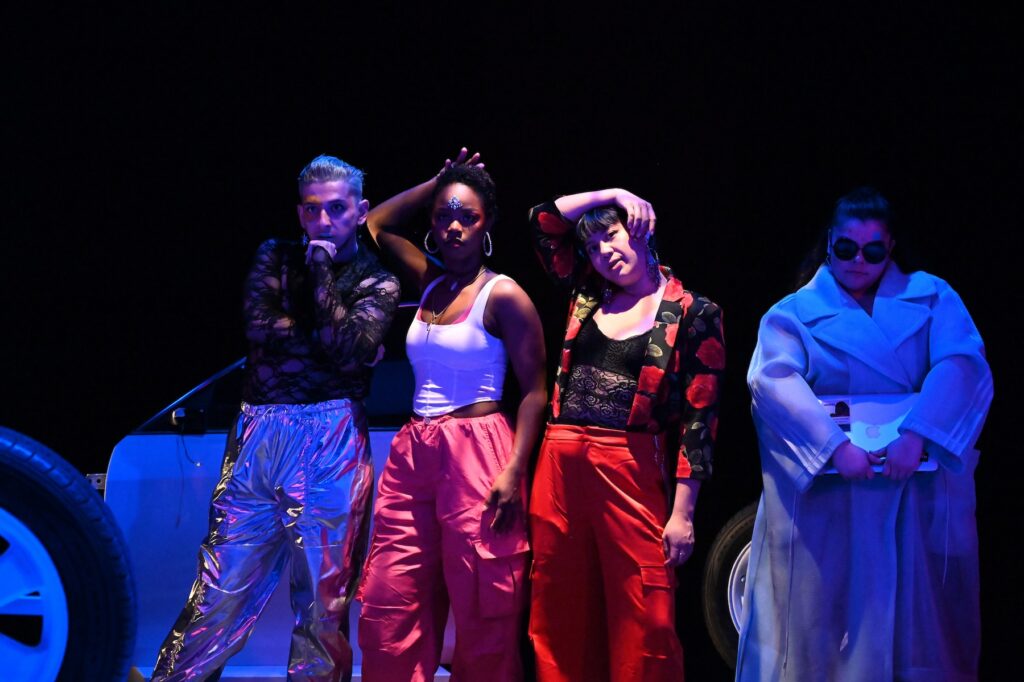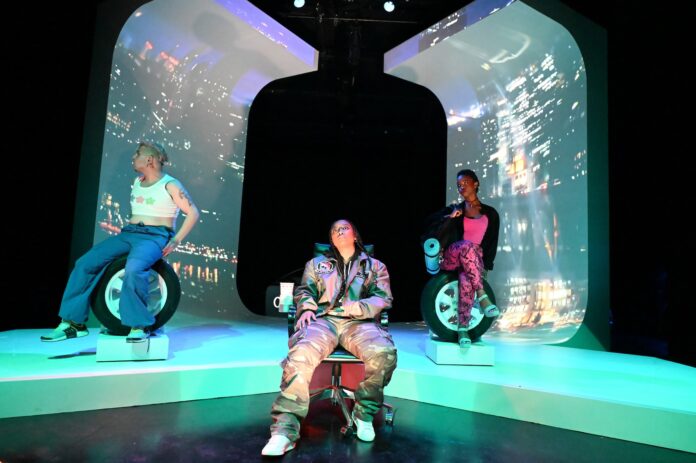When one both writes about and regularly patronizes the arts, one frequently sees the two intersecting in unexpected ways. Still, if you’d told me even a week ago that I’d be watching a play about SF evictions one day after my landlord gave me and my housemates an “out-by” date, I wouldn’t have believed you. At least, I wouldn’t have wanted to believe you. Part of me has been expecting this from the moment I first heard the words “Ellis Act.” So now, it’s time to hustle.
And with that news in the back of my mind, it’s as if I suddenly became a character in Ashley Smiley’s Dirty White Teslas Make Me Sad (world premiere through March 17 at the Magic Theatre, SF) without even knowing it. At least I was among my own.
Smiley’s story—which had an acclaimed developmental production with SF BATCO last year—revolves around Black SF-born ride-share driver Naima (Anna Marie Sharpe). She and mother Delcina (Tanika Baptiste) have three days to be out of their longtime home and move somewhere more affordable in the East Bay. Naima, not ready to leave her birth city, is open to any and all suggestions about making lots of money fast.
That desperation catches the attention of her uncle Pappadeaux (Juan Manuel Amador), a mechanic with a few other side hustles that aren’t exactly written about in Forbes. Through a bit of skullduggery, he connects Naima—using the alias “Sloosh,” “like the tides and Land’s End”—with expert hustlers Caesar (Lauren Andrei Garcia), Brüt (Jessica Maria Recinos), KoldKuts (Guillermo Ornelas), and BabyGurl (Jamella Cross). Indeed, they have a plan, but it’s not so much to make money as it is a means to strike back at the nominal Emerald Mine Space Karen-status symbols that congest the streets of San Francisco.

Smiley clearly wants to show off her love for the city in which the play is set (and performed). There’s an entire sequence in which Sloosh and BabyGurl, barely able to hid their attraction to one another, wax nostalgic about the Black SF events that have all-but-vanished—not unlike the majority of Black SF residents. It’s the sort of play boasts its Bay Area pride from the offset by playing Lucy Pearl in its first scene. It’s a play that looks at gentrification as not merely a destructive act towards a city’s history, but an outright act of war.
So much so that their plan of attack comes off like guerilla warfare, complete with clandestine meetings, undercover “agents,” and a reliance on the enemy’s hubris. Indeed, the plan hinges on the fact that all those digital accoutrement of Teslas make them not nearly as secure as they boast.
All of that is great, but the script also tends to get lost in its own tangents. We SF lifers can all appreciate an out-of-nowhere joke at the expense of Lowell High, but there comes a point when the characters’ name-dropping seems more like status-cred than a means of shading in the characters. Similarly, it’s powerful when Naima prays to a-god-who-won’t-answer to just let up a little on life’s constant curveballs. It’s not as powerful when the monologues begin to feel like monologues for their own sake. One can appreciate Naima’s throughline of doping herself up to numb the pain (usually with weed, but later with Tesla pills) only for that to take a dangerous turn during the climax. But not everyone in the cast gets that sort of arc.
Which is a shame, because Smiley and director Raelle Myrick-Hodges have a good ensemble to work with. I’m trying to remember seeing Anna-Marie Shapre in Aurora Theatre’s Paradise Blue, but that was quite some time ago. Nevertheless, she finds the right consistent tone for Naima/Sloosh, making her pain real and her pleas to God all the more heart-breaking. As Delcina, Tankia Baptiste is very much still the scene-stealer from SF Playhouse’s Nollywood Dreams last year.

She, Juan Manuel Amador, and Jamella Cross each continue their streaks of being reliable local talent and consistently a pleasure to watch. The three actors with whom I’m not readily familiar—Lauren Andrei Garcia, Jessica Maria Recinos, and Guillermo Ornelas—succeed in making their characters memorable, even when they don’t have much to explore with their characters. All do great under Myrick-Hodges’ direction.
Of course, one would be remiss not to mention another eye-catching set built by Tanya Orellana. Upon walking into the theatre, one is greeted by a detached white Tesla car door. The other door covers a ghost light on the upstage wall. Four tires stand on platforms scattered about. The all-white set seems to form a giant “X” on the floor—a nod to Tesla’s Twitter-killing boss?—that seems to grow into two curved columns upstage. Those columns frequently work as screens for Joan Osato’s projections. (Be warned that there are flashing strobes.)
Although Magic Theatre’s official materials say masks are to be worn when not drinking in the lobby, there doesn’t seem to be anymore enforcement of it, as quite a few people were bare-faced during the opening night performance. Still, that made it a bit more comforting for my masked face to once again see the many standing air filters around the theatre and in the lobby. My Aranet4’s CO² readings hit about 1556ppm at the end of the 80-minute show, which is actually a low number for both the venue and in general.
Early on, Naima/Sloosh ponders the way white Air Jordans are fretted over by (mostly Black) sneakerheads because they’re often the closest thing they have to a luxury item. This is why it stings her and her mother to see affluent San Franciscans letting their white cars get dirty simply because they can afford to buy new ones; they have no idea what it’s like to not have everything at your beck and call. Incidentally, I spent the day in North Beach where I saw my first-ever Tesla “truck” driven in public; the just-released auto monstrosity was dirty as a car three decades older.
As a Black San Franciscan trying to ponder his next strategic move, I related to Smiley’s characters on an incredibly deep level. The journey on which she takes them isn’t the most clearly-mapped, but she’s wise enough to populate it with appealing travelling companions.
DIRTY WHITE TESLAS MAKE ME SAD’s world premiere runs through March 17 at the Magic Theatre, SF. Tickets and further info here.








